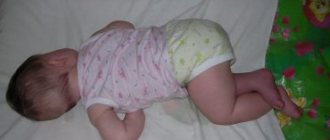Healthy sleep becomes the key to the normal development of a child. But, having brought home the long-awaited baby, after a certain period of time, mothers begin to notice with alarm that the child wakes up more than once during the night, is capricious and cries for no apparent reason. Tiring vigils occur repeatedly and their frequency increases. Doctors divide sleep disorders into physiological and psychological. Parents need to figure out why their child wakes up every hour at night.
The baby is not sleeping. Why?
In children under one year of age, sleep phases change at hourly intervals. If there are no prerequisites: illness, hunger, thirst, nervous disorders, the child, even waking up, will immediately plunge back into sweet dreams.
It is noted that sleep disorders can be initiated by parents themselves who have not established the correct daily routine. The child wakes up every hour at night if, before he goes to bed, there is music in the house, loud conversations, or playing outdoor games. It is recommended to introduce rituals such as evening bathing, lullabies, and twilight into everyday life.
Physiology
- The temperature in the room where the baby sleeps is extremely uncomfortable. The ideal range is 18-23 degrees, so even in winter it is not recommended to create a “greenhouse” in the bedroom.
- Perhaps the baby soiled the diaper or wet the diapers. For all children without exception, this is severe discomfort that forces them to wake up.
- The child is hungry or wants to quench his thirst. Even in their sleep, small household members are unable to give up their needs. With this behavior they try to convey to their parents the true reason for awakening.
- High temperature, nasal congestion, teething, tummy pain, colic, etc.
- The child wakes up every hour at night or even more often if he sleeps in uncomfortable clothes that restrict his movements. It is quite possible that he is uncomfortable with the synthetic material of the bedding (if it happens to be used), or the tightly pulled diapers. All these factors can cause itching and even pain.
- There is excessive noise in the baby’s bedroom, too light, etc.
Such factors can be easily eliminated; the main thing is to reliably determine the cause.
Psychology
- The baby’s psyche is unstable, receptive and excitable. The child wakes up every hour at night, when the worries of the day have a negative impact on him. Any little thing, even the sad ending of a fairy tale, can trigger an untimely awakening, especially if there is a quarrel with your mother.
- The negative mood of family members is immediately transmitted to the child. This factor often makes children nervous and, as a result, disrupts a good night's rest. A healthy environment in the family is the key to the baby’s peace of mind and restful sleep.
- Late viewing of cartoons, TV, tablets and smartphones. The child wakes up every hour at night due to the violent emotions received after this.
- Lack of daily positive emotions, tactile sensations, and communication.
- Fears of various natures, including those based on the loss of a mother.
- Bad dreams.
The mother must show maximum care and patience in order to identify and eliminate the psychological causes of sleep disorders in the child.
Overcoming a difficult period: advice to parents
The main thing for parents when their child has sleep disturbances is not to panic. In most cases, according to Dr. Komarovsky, this is a temporary phenomenon that does not carry serious consequences. Check with your doctor; your baby may need less sleep at this age.
You need to observe the baby to find out the cause of his anxiety, this will also help to catch the symptoms that the baby is ready to go to rest. These include:
- rubbing the eyes;
- yawn;
- loss of interest in toys;
- reluctance to communicate.
If these signs occur, you should immediately put your baby to sleep; he will fall asleep easier, faster, and more soundly. Be sure to perform all the usual procedures for a baby, this will help him get ready for sleep. You need to ventilate the room, if the weather permits, leave the window ajar.
Advice! Be sure to turn off the lights, this promotes the production of the sleep hormone melatonin.
An hour before falling asleep, noisy games are stopped. You can get a relaxing massage and perform hygiene procedures. A warm bath with soothing herbs will help you sleep soundly. Then he needs to eat enough.
The baby should sleep in silence. You can accustom your baby to background noise, quiet conversation, and sounds of nature. You definitely need to check the crib. Perhaps the mattress or bedding has begun to cause discomfort in the child.
You should choose a diaper that is comfortable and breathable. The liquid in it should be distributed evenly, the elastic bands should be soft and not cause pressure. Clothes are preferably made from natural fabrics that do not restrict movement.
If the baby receives little physical activity or emotional impressions during the day, he may simply not get tired. While playing, the child develops, masters certain skills, and improves the nervous system. If this does not happen, energy is not wasted, and the body does not feel the need for rest.
Serious reasons
- Nocturnal enuresis. If this is the norm for infants, then at an older age children should get up and go to the potty. If your child wakes up every hour at night due to frequent urges to go to the toilet, you should consult a doctor.
- Apnea. This is a disease characterized by short-term pauses in breathing during sleep. Immediate medical intervention is recommended.
- "Swinging movements." The baby can rush around the crib, scatter nearby things, get up and fall again, and diligently bang his head on the pillow. Such symptoms, especially on a regular basis, may be signs of increased intracranial pressure, epilepsy, and mental disorders. Specialist consultation is required. If a child wakes up every hour at night for 8 months, a year in a row, this is not the norm, but a sign of a dangerous disease.
Hourly night awakenings in a six-month-old child
In six months, a child masters many skills and receives a large number of new impressions. The immature nervous system is overloaded, which prevents the baby from falling asleep. A possible reason why a 6-month-old baby often wakes up at night could be teething and he may be thirsty.
Attention! The baby begins to form its own biological rhythms. Some children fall asleep easily and quickly, while others take much longer to do so. Babies may have different needs for the duration of rest, due to their individual characteristics.
Poor sleep is caused by the following factors:
- staying awake for too long;
- lack of fatigue;
- emotional overload before bedtime;
- fear of separation from mother;
- unusual resting place;
- disruption of the usual sleep ritual.
One or more of these reasons may cause your baby to become restless, anxious, and have poor sleep. At this age, the child may already consciously resist falling asleep. There are so many new and interesting things around, but vacation deprives you of these entertainments.
The concept of sleep regression in children
There are moments in the life of every baby when an already established stable sleep gives way to anxiety, shuddering, the child begins to wake up frequently, cry at night, and the slightest rustle can wake him up. This phenomenon is called regression. There is no need to panic, this is a normal physiological process. Such periods occur at the ages of 6 weeks, 4,6,9, months.
Pediatricians disagree about the causes that cause them, but there are common signs:
- problems falling asleep in the evening;
- reduction in the duration and quality of daytime rest;
- frequent urges at night accompanied by crying;
- changes in appetite;
- increased nervousness while awake.
The child demands attention, asks to be held, and does not let go of his mother. There are no symptoms of the disease, the baby is in comfortable conditions. He may simply drop his pacifier, want to eat, and in a state of half-asleep even a slight noise can wake him up.
Possible explanations for the phenomenon
Manifestations of deteriorating sleep in children coincide with phases of active growth. A period of restless sleep indicates that the baby is developing and forming. At the time of the third regression, when a 6-month-old child wakes up every hour at night, the internal restructuring of the body, the little person’s biorhythms, and teething can influence.
The baby does not sleep well at night due to disturbing pain, then he may get enough sleep during the day, and in the dark he will be capricious again. Getting used to sleeping twice a day takes two to three weeks and causes discomfort for the baby.
Progressive diseases and their symptoms
Typically, periodic sleep disturbances in infants are physiological in nature and are not a symptom of pathology. But if awakenings accompanied by crying and whims occur more than twice a night, continue for a long time and are aggravated by other disturbing manifestations, you should consult a doctor. These may be nervous disorders, epileptic seizures in childhood. They are accompanied by repetitive movements, the baby may arch his back and whine. There are other manifestations characteristic of each type of disease.
It is important to know! Sleep problems can occur due to sleep apnea. Breathing stops for up to 10 seconds are observed, up to 3% of infants are susceptible to them. The disorder can be obstructive, central, or mixed; the occurrence of one episode per 60 minutes is the norm. If five or more attacks occur during this time, we can conclude that pathology is present.
The first type occurs in a number of neurological and somatic diseases. Air flow is disrupted and breathing becomes ineffective. The second type indicates the possible presence of a cerebrovascular accident, a tumor, which can occur in premature infants.
Causes that do not cause concern
In most cases, sleep disturbances in a six-month-old baby should not be a big concern. Parents should watch their baby and not cause panic, and they will understand the reason for his anxiety.
You can consult a pediatrician. He will prescribe examinations, tests, and consultations with specialists to exclude serious pathologies in the child.
Physical discomfort
By the age of six months, a child gets used to sleeping in a certain place. Lulling him to sleep in another crib or room can cause him discomfort. Some children cannot be put to bed at a party. Rearranging furniture or changing wallpaper can cause crying. The child is able to react even to different bedding, with a different pattern and color.
An uncomfortable cradle prevents your baby from falling asleep; he may feel hot or cold. The habit of falling asleep at my mother's breast and motion sickness cause persistent addiction. Weaning from it is accompanied by a violent protest on the part of the baby, it is more difficult to put him to sleep, and sleep becomes more disturbing.
Psychological factors
The child has been awake for a long time and is overtired, but it is not possible to put him to sleep. A large load on the fragile nervous system does not allow it to relax. Signs of sleepiness in a child should not be ignored. Important! Parents should be attentive and put the baby to bed at the first symptoms. Otherwise, strong indignation will follow, the process of going to bed will be delayed, and the daily routine will be disrupted.
Active games, a working TV, guests can prevent the child from relaxing and falling asleep. His nervous system cannot quickly switch from a state of emotional arousal to calm falling asleep.
A 6-month-old baby often wakes up at night due to fear of separation from his mother. The baby gets so used to having her always nearby that any disappearance from sight can be regarded as a tragedy. He becomes overly anxious. This condition requires consultation with a doctor to correct the child's nervousness.
If babies don't sleep
If the child is still very young, the cause of the sleep disorder can lie in anything. Most often, the baby experiences colic, his teeth begin to cut, and in some cases, peaceful rest is disrupted by worms, which are active precisely at night.
If such conditions recur quite often, it is recommended to visit a pediatric neurologist and pediatrician. Doctors will prescribe a full examination, during which the actual state of the baby’s health will be determined.
If the examination shows that the child wakes up every hour at night because teeth are being cut, the pediatrician may prescribe special medications. As a rule, these are gels that alleviate the condition of the baby. The baby's gums are treated with the drug, and he does not experience pain.
Causes of insomnia
In fact, the situation when a one-year-old child regularly wakes up at night is not so out of the ordinary. According to the observations of child psychologists and pediatricians, about 20% of children under the age of 2 consistently wake up 5 times a week at night. There can be many reasons for this.
If the baby does not have neurological disorders, he may not sleep at night for one of seven reasons:
- “Slept” during the day. If the daytime nap is delayed, the baby will definitely wake up at night and demand games and attention.
- Went to bed too late. The biological clock of one-year-old children is set to fall asleep at 21:00-22:00. If this time is missed, the baby may sleep restlessly and be capricious all night.
- There is no stable daily routine. Insomnia can be caused by putting your baby to bed at different times.
- Can't fall asleep on his own. If by the age of one year the parents have not taught the baby to fall asleep without motion sickness, he will have problems with sleep for a long time.
- Got overexcited in the afternoon. If a child runs around and plays around a lot in the evening, or plays late into the night, he will most likely have difficulty falling asleep.
- Feels discomfort. The cause of insomnia can be an uncomfortable child's mattress, a blanket that is too warm, thirst and other natural needs.
- The lighting is disturbing. Even a dim light source can interfere with a normal night's sleep.
Or maybe he's hungry?
If causes related to digestion are identified, the child’s diet is subject to adjustment. If he is breastfed, the mother should be more careful about her diet and eliminate all inappropriate foods that cause upset in the baby. If the parents support artificial feeding, the formula is probably not suitable for the child, so it is changed to another. The baby is monitored and it is necessary to look at his reaction to new food.
If the reason is hunger, it is recommended to increase the amount of food that comes to the child with the last feeding. In addition, you should make sure that your child eats enough throughout the day. Some children are extremely active and consume a huge amount of calories that are not replenished with food. It is at night that these babies get the missing nutrients. Many parents are worried about their baby waking up every hour during the night. What to do first? Pediatricians recommend reviewing his diet. It is possible that some aspects are subject to adjustment.
If your baby wakes up every hour during the night, you should check to see if he is wet, especially if he sleeps in a swaddle rather than a diaper. Some children become very anxious about this. However, you should be careful, and if the baby sleeps peacefully in a full diaper, you do not need to wake him up.
Once again about sleep conditions
If a child wakes up every hour at night and cries, parents should create comfortable conditions for him to rest: let the room have a normal level of humidity and temperature, ventilate the room before going to bed. Very often, young children react sensitively to stuffiness or cold, excessively dry or humid air.
Parents should be attentive and observant. Some babies begin to get nervous in their sleep because their clothes are too tight, then they should be sent to bed in light pajamas or naked. Freedom-loving babies will certainly try to undress and free themselves at night. Do not insist on the usual way of dressing. And vice versa - overly impressionable children, falling asleep in loose things, can accidentally wake up from the movement of their own hand and cry, scared.
Why does a child cry in his sleep or when he wakes up?
There are many reasons why a baby may cry in his sleep, or wake up and immediately cry. In fact, they are no different from those we have already listed above. At night, the baby may experience intestinal colic, and his mouth or nose may become dry (for example, due to the dry and warm climate in the room).
It is reasonable to act in this situation in the same way as usual. The easiest way to understand why exactly the baby cried and roared with “crocodile” tears is by experimenting and analyzing after what actions of yours he calmed down. You picked him up, kissed him, rocked him - and the baby fell asleep, which means the crying was instinctive. They fed him - and the baby began to sniffle contentedly, which means he woke up hungry. They changed a wet diaper or stroked a tense tummy, helping to “endure” intestinal colic - and the baby gradually calmed down, which means the reason for the crying was clearly pain and discomfort.
But it’s too early to blame any nightmares that make your little one wake up in the middle of the night and cry heart-rendingly. Night terrors can indeed be the cause of children's crying, but already at a much older age - about 4-6 years.
What is the norm?
- Infancy. The baby sleeps for about ten hours. It is normal for your baby to wake up every hour during the night. 3 months or less is the age at which he is sensitive to everything that happens around him. Parents should be patient and try to eliminate the possible causes of concern described above.
- One-year-old babies. According to statistics, out of five children, one child wakes up every hour of the night per year. During this period, a lot depends on the character of the baby; for example, restless and active children sleep very lightly. They can jump up at any sound and get up early. To smooth out the situation, doctors recommend individually preparing them for bed. This could be reading a favorite fairy tale or a lullaby song.
In addition, it is at the age of one, up to two years, that it is advisable to teach the baby to fall asleep on his own. That way, if he wakes up at night, he won't need parental help to fall back into daydreaming. Closer to the age of two, children may experience fears. To eliminate them, you can install a cheerful night light and put your favorite soft toy in the crib. If your child wakes up every hour at night for no apparent reason, it is recommended to consult a doctor.
For what reasons does a baby wake up?
Waking up a 6 month old baby is quite easy. The intervals between periods of wakefulness are still quite short. During rest, the baby immediately reacts to any noise. In addition, frequent awakenings can be triggered by other factors, among which the most common are teething and hunger.
Bad habits
If a baby cries in a crib every half hour, then it is quite possible that this occurs when conditions change. If they started putting him to sleep in a separate bed, and previously he was resting calmly next to his mother, sucking on the breast, then this will inevitably affect the quality of his night's rest.
Similar violations can occur with the introduction of complementary foods. The baby is still waiting for night feeding, but is not receiving breast milk. Instead, he is given a bottle of formula or liquid porridge.
Pacifier weaning is another cause of concern. It is quite possible that it is worth holding off on this for now.
Overwork
Active games in the evening can lead to the baby becoming overly tired and unable to fall asleep soundly. It turns out to be very problematic to lay him down even during breastfeeding.
You should not give the child the opportunity to stay awake longer than the allotted time, believing that in this way his sleep will be stronger. On the contrary, if he does not fall asleep at the appropriate hour, when melatonin (the hormone responsible for the cyclicity of all phases of sleep) is intensively produced, his rest will become restless. At the same time, parents will note that the baby often wakes up at night and cries.
The biological clock
To ensure the baby has a restful sleep, he needs to be put to bed at a strictly defined time. The baby's biological rhythms are set in such a way that he needs to fall asleep between 19 and 21 hours and wake up at 6-8. After this comes the time of wakefulness with breaks for short daytime rest. The baby may take longer walks than usual or fall asleep earlier than expected. As a result, frequent awakenings occur at night.
Hunger
One common reason why a six-month-old baby wakes up frequently is hunger. During this period, the baby, as a rule, is not yet accustomed to falling asleep without the breast, but milk alone is no longer enough to get enough. In the evening it is recommended to give him porridge or any other nourishing complementary food. Only after this can you breastfeed the baby.
Teething
Many children have a hard time with the process of teething, especially canines. Swelling gums can be accompanied by severe pain. Often there is an increase in body temperature and abnormal bowel movements. As a result, the baby has poor sleep, is capricious and does not eat well.
The relationship between sleep and breastfeeding
Specially conducted studies have established that children who sleep with their mother feed on her milk for the longest time. The dependence lies in the frequency of putting the baby to the breast. Moreover, babies sleeping in a separate crib are forced to wake up, cry and grunt in order to draw attention to their hunger. As a result, both the “culprit” and the mother take longer to fall asleep again.
This pattern is especially clearly visible when the child wakes up every hour at night (8 months or a year - it doesn’t matter). However, despite the undeniable benefits of breast milk, such sleep organization also has negative consequences. The baby gets used to receiving the breast on demand and is simply unable to fall asleep and sleep peacefully all night without it.
That is why children, starting from the age of six months, should learn to rest separately. If the child wakes up every hour at night, 7 months is quite a sufficient period to normalize the situation. The baby is able to completely wean itself off the mother’s breast as the main factor of protection and reassurance. Babies stop kissing for the sake of feeling close to their mother. They learn to be calm without her.
6 month old baby wakes up at night and cries
A baby's restless sleep at six months of age is most often a natural reaction of the body to various factors and irritants. As a rule, frequent breastfeeding at night in this case does not give the desired result. The child sleeps restlessly, often wakes up in the crib and cries.
Sleep disorder at the age of six months may be due to physiological reasons. Children at this stage learn a lot of new things, begin to move actively, make the first conscious sounds, and respond fully to everything that happens around them. Naturally, in this case, dreams will be more emotional and colorful, and night's rest may be disrupted.










